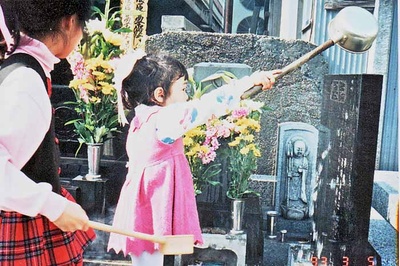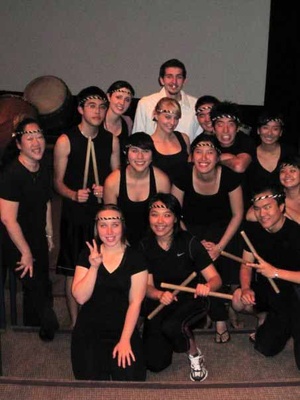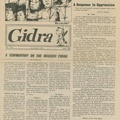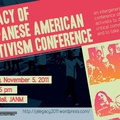Are you Japanese? Do you speak Japanese? You look Japanese. Isn't your name Japanese? These are questions that I have heard all of my life, and at times I felt that they tried too hard to constrict me into a nice neat mold. I felt like the abstract block trying to fit into the perfectly round hole, and with each response I gave, I felt as though the mold laid out for me was one that I could never fit in.
I was born in Southern California, and I am a second generation Japanese American. My parents were both born and raised in Japan, my father moving to America for his work and my mother seeking a change of pace and style. They were both drawn to the stories of opportunity and greater freedom in America, and though they had their wedding ceremony in Japan, they eventually decided to move to sunny SoCal and to begin a family here.
When my older sister was born, my parents taught her to speak and understand both Japanese and English, but at school she was constantly teased for her accent, and unfortunately, her elementary school teachers cruelly hinted at their doubts about her learning capabilities. My parents feared that same experience would continue once I was born, so they emphasized English at home. My father strictly spoke in his broken English, and my mother spoke half English, half Japanese. Soon, both my sister and I only spoke English. Though my sister fully understands Japanese, I could only catch snatches of a conversation. Up until the end of my high school graduation, I could not hope to understand an entire conversation, let alone string a full, comprehensible sentence together. In this manner, my Japanese skills consisted of Itadakimasu (Let's eat/I thankfully receive this food), Gochisousama (Thank you for the food), Ittekimasu (I'll be going), and Itterasshai (See you later) as well as simple commands to do chores such as "Inu no take care shinasai" (Take care of the dog, i.e. Clean after her). Even with that, the Japanese was highly mingled with English, and I still forget how to say "take care of" in Japanese.
I only visited Japan when I was very young, as traveling is expensive and I liked being with my friends during vacations. The last time I visited was in the summer 13 years ago when I was 6, but even back then when I tried to connect with my relatives, I had very limited skills. My time with them often resulted in blank stares and shy smiles, with a puzzled look towards my mother to beg for a translation. Furthermore, I was visiting my relatives on my mother's side, who are from Tokushima, so their dialect was already difficult to understand. I felt so very foreign and small(er) in Japan, as the customs that I felt were reproduced at home were not exactly the same as those of my relatives. At this stage in my life, I was too young, swept up by the fun games and delicious treats of my vacation, that I was too blind to see the implications of my ignorance of having such a disconnect with not only my distant relatives, but with my mother.
With English being my primary language and with no reinforcements to use Japanese, I essentially neglected that aspect of my heritage. Neither of my parents was involved in the Japanese American community, and the areas that I lived in and attended school had few, if any, Nikkei that I encountered, so my exposure was further limited. Adding to that, I felt the remnants of the hostility that people still harbored about Pearl Harbor against Japanese people. In hearing those hostile words, I felt shame wash over me, and within me welled a desire to establish a distinct identity from the Japanese. I associated myself with being an American, as Japan was a foreign nation miles away, speaking a tongue that I could not understand. It was during that period that I rejected being Japanese. I felt that I was being labeled as something I was not, so I struggled to define myself. My ignorance in the Japanese culture and history made it difficult for me to comprehend or even connect myself with being Japanese, and certain mannerisms of my parents did not quite translate over to me. Also, the language barrier in particular skewed my perception of what it is to be of Japanese descent. With my parents' decision to focus more on the present rather than their past, it made it difficult for me to gain any insight into their life in Japan. I began to focus more and more on my studies in school, and Japanese/Japanese-American studies were not a focus, or even a full chapter, of our curricula.
I became so engrossed in my own studies that it is quite astonishing how little I had noticed the rift between my parents and myself. But, when my mother began to watch Japanese dramas, I really saw how little I knew of the Japanese culture, and even less, the few long, fulfilling conversations that I could have with my mother. With such a limited vocabulary, it is hard to give adequate descriptions and fully express the ideas that we want to convey. Even without verbal communication, emotions and gestures can give the general gist, but the details that truly make a story enrapturing become lost through the generalizations of body language. Even though we may get the big picture, once the fine details become lost, we cannot hope to fully grasp the story in its totality. It was then that I truly felt regretful at the fact that though my parents tried so hard to become "American," I easily accepted pursuing that past without a second glance into their heritage.
In my unfamiliarity with the Japanese culture that is so intrinsically tied to the identity of my parents, my interest in this foreign culture grew not only as a personal passion of interest, but also as a means by which I can better come to understand who I am as an individual. Though my major is in East Asian Studies, focused on the history, literature, culture, politics, and economics of Japan, the history of Japan lies not only within its boundaries, but also within the people who have chosen to leave their homeland in search of a new life.
Furthermore, the conditions under which they emigrated reflect the relations that Japan had with other countries during that period as well as the consequences of the growing changes within the nation. The diversity of the Nikkei communities is apparent not only through the number of countries to which Issei (first generation Japanese immigrants) have emigrated, but also the various identities formed within the diverse regions they inhabited. With the growing trend among historians to provide a more socio-cultural historical account, it is important to see the significance of the formation of each distinct definition of what is Nikkei. Not only do their accounts record the past, but also through the eyes of our contemporaries, we see the change over time that they have seen as well as gain insight into the distinct similarities among what may seem like vast differences. The subtle changes that occur through the choices of everyday people are powerful enough to form new traditions and a greater understanding of oneself. I believe the foundations of a community lie within its people, and the economic and historical context in which they develop express the value of the culture they seek to preserve and adapt to present customs.
I know that I too had fallen victim to accepting a monolithic definition of what it is to be Nikkei. Having been so detached from the Nikkei and Japanese culture, it is hard to take the scope of all the history and culture in such a short amount of time. In order for me to allow it to sink in, I made generalizations and an archetype that revolved around the impressions I had from many non-Japanese individuals. I equated Japanese American with being Japanese, and not being a distinct and unique entity all in itself. The Japanese American experience is one that is often glossed over in many history texts, but that is no excuse not to take the initiative and learn more about it.
© 2009 Yoshimi Kawashima







